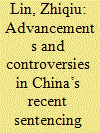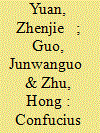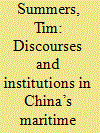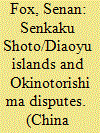|
|
|
Sort Order |
|
|
|
Items / Page
|
|
|
|
|
|
|
| Srl | Item |
| 1 |
ID:
148503


|
|
|
|
|
| Summary/Abstract |
This article discusses in detail the content and context of China’s recent sentencing reform and its social, political, and criminal justice implications, as well as its limitations. The focus of China’s criminal justice reforms over the past 37 years has been predominantly on the trial process; the sentencing process has been largely neglected. Revelations of widespread sentencing inconsistency led the Supreme People’s Court (SPC) to initiate sentencing reform in 2005. The intent of the reform was to promote transparency in the sentencing process, ensure consistency in sentencing dispositions, and guard against inappropriate judicial leniency and severity via new sentencing procedural rules and guidelines limiting judges’ sentencing discretion. In addition to discussing the new sentencing procedures and guidelines, this article also examines some hotly debated issues, including whether China’s sentencing process should be completely separate from the trial process; the meaning of ‘sentencing consistency’ in the context of China’s social and political development; and China’s unique sentencing principles in comparison with the practice of some English-speaking jurisdictions.
|
|
|
|
|
|
|
|
|
|
|
|
|
|
|
|
| 2 |
ID:
148500


|
|
|
|
|
| Summary/Abstract |
John Mearsheimer has compared China’s attitude towards the South China Sea to the Monroe Doctrine of the United States. Mearsheimer does not accord international law much weight and certainly does not regard it as determinative of political outcomes. But many observers of China’s disputes in the South China Sea look to international law for rules and processes that could facilitate peaceful resolution of the disputes. In doing so they are variously puzzled, bemused, and/or angered by China’s assertion of the nine-dash line (南海九段线). This article draws more broadly on the literature on the Monroe Doctrine, viewing the doctrine as: a unilateral pronouncement of foreign policy; representing resistance; embedded in domestic as opposed to international law; and an assertion of legitimate regional hegemony. Through applying the analogy of the Monroe Doctrine, the article seeks fresh insights into China’s legal position in relation to the South China Sea and into the significance of the nine-dash line in terms of international law.
|
|
|
|
|
|
|
|
|
|
|
|
|
|
|
|
| 3 |
ID:
148502


|
|
|
|
|
| Summary/Abstract |
The majority of Anglophone literature tends to portray Confucius Institutes as playing a successful role serving China’s interests in its foreign collaborations. So far, the threat of this institution has been largely stereotyped and even taken for granted. Few scholars question the influence and capacity of the institution on both global and local scales. Relying on cartograms, correlation and national image analyses as well as qualitative studies, this article examines the influence of Confucius Institutes as the institution globalized and localized. This article reports three main findings: (1) the geopolitical influence of Confucius Institutes is uneven in different regions and they are engaged in an ongoing process of geopolitical construction; (2) analyses of correlation with China’s national image show that not only does the influence of the institution vary in regions but also that the project could have a negative impact on bilateral cooperation, suggesting that, contrary to popular thinking, Confucius Institutes have not had a positive impact on China’s global interests; and (3) the capacity of the institutes in everyday operations is systematically limited, reflecting China’s inexperience in managing this global cultural network. Confucius Institutes are generous in making economic concessions but are hesitant during political negotiations, which can be said to mirror China’s patchy performance in economic and political reform.
|
|
|
|
|
|
|
|
|
|
|
|
|
|
|
|
| 4 |
ID:
148499


|
|
|
|
|
| Summary/Abstract |
This article examines discourses around China’s maritime disputes. It adopts an English School approach to international order, making use of institutions governing relations between states which are themselves discursive in nature. The article argues that discourse is a particularly important factor in maritime disputes given the ambiguities resulting from historical and ongoing changes in conceptions of maritime space and sovereignty. Further, although these changes have led the institution of international law to play a growing role in questions of maritime sovereignty and jurisdiction, the article argues that the application of these legal frameworks is itself partly discursive and creates ambiguities which inform maritime disputes between key states in East Asia. The article then considers an example of discursive contestation by examining the use of freedom of navigation in the positions taken and practised by the United States and their role in US–China maritime dynamics. It concludes by suggesting that contested discourses around maritime disputes in East Asia are best understood as part of an ongoing and dynamic process of the renegotiation of regional and international order in East Asia.
|
|
|
|
|
|
|
|
|
|
|
|
|
|
|
|
| 5 |
ID:
148501


|
|
|
|
|
| Summary/Abstract |
The Senkaku Shoto/Diaoyu Islands dispute in the East China Sea and the Okinotorishima dispute in the western Pacific are currently among the most prominent maritime disagreements between Japan and China. Both disputes are influenced by neorealist strategic and material interests in relation to sea lines of communication, the demarcation of maritime territory, exclusive economic zones (EEZs), and continental shelf claims. Despite material similarities, it is the issue of the rightful ownership of the historically sensitive Senkaku Shoto/Diaoyu Islands that has seriously strained bilateral relations. The way that the disagreements manifest themselves arguably reflects the central role that such liberal and constructivist themes as emotion, identity, nationalism, and domestic politics play in the dispute. The Senkaku Shoto/Diaoyu Islands dispute in particular is one where domestic politics and ideational influences play a disproportionately strong role in escalating tensions and complicating attempts at resolution. This article aims to examine the shared and contrasting ideational and material aspects of these two disputes, and to show how these interests shape Japan’s and China’s respective approaches in both cases. It thus sheds some light on when and why Sino-Japanese ideational and material interests intersect and how they affect bilateral relations.
|
|
|
|
|
|
|
|
|
|
|
|
|
|
|
|
|
|
|
|
|